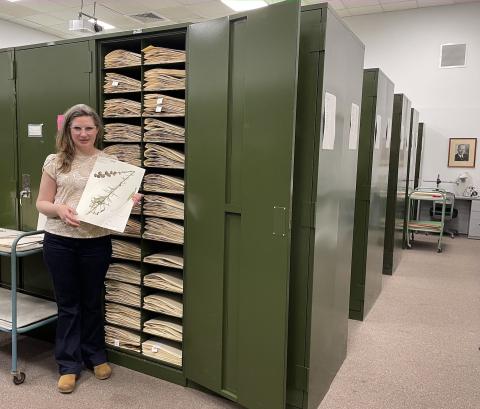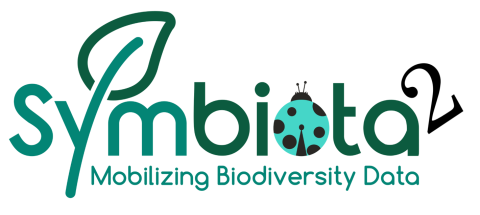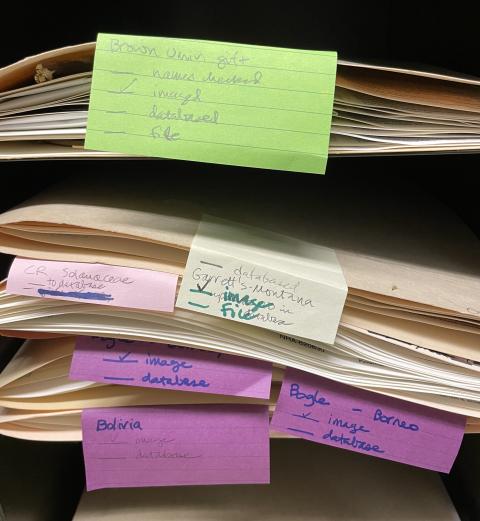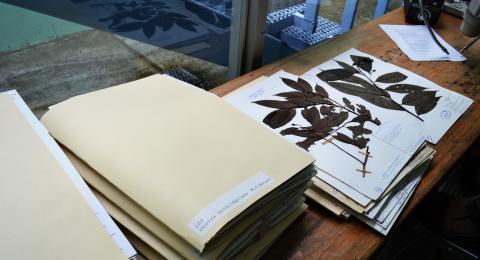Visit in Person

NHA is available to visitors Monday to Fridays from 9 am to 5 pm by appointment. The herbarium is temporally located in Putnam Hall, Room 133 until 2024. No food may be brought into the facility.
Contact the Collections Manager, Erin Sigel (erin.sigel@unh.edu), to arrange for your visit and parking. Please describe the purpose of your visit, any particular specimens of interest, and any special request. School groups and botanical enthusiasts are welcome!
Search Specimens Online
Nearly all specimens at NHA have been digitially archived with high resolution images and/or electronically database. The means NHA collections are publicly accessible worldwide! Specimen records and images can be accessed on one of five Symbiota portals:

Loans
Loan Policy
Loan requests will be considered only from recognized botanical institutions recognized on Index Herbariorium and not from individuals. Please review the NHA official loan policy statement.
- Requests for loans should be addressed to the Director or Collections Manager. The request should include: name and status of the researcher, nature and scope of the study, taxa to be studied (including possible synonyms), and the geographic scope of the study, if appropriate.
- Loans are made for a period of one to two years. If additional time is needed a request for an extension may be submitted. Partial returns must be approved by the Director or Collections Manager.
- While on loan, it is expected that the specimens will be handled according to standard herbarium procedures and stored in airtight, metal cabinets with proper insect control protocols.
- Material must not be removed permanently from specimens without consent of the Director or Collections Manager. See Destructive Sampling Policy below. The judicious dissection of specimens is permitted. Fragment packets should be used for loose material.
- All borrowed material should be annotated. Annotations should be laser-printed on acid-free annotation labels. The annotation should include: generic name, specific epithet, author, annotator’s name and affiliation, and the date. We request that type specimen annotations include the basionym and place of publication.
- Returning loans should be packed to insure safe transit. It is expected that the borrowing institution will pay costs for the return shipment. A shipping notice should be included with the specimens.
- Hodgdon Herbarium specimens should be cited using the standard acronym NHA. Copies of publications citing our specimens should be directed to the Collections Manager.
Destructive Sampling Policy
The judicious dissection of specimens is normally permitted for research purposes. Permanent removal of material from specimen sheets must be approved by the Director or Collections Manager, and decisions are made on a case-by-case basis. All destructive sampling must adhere to the following guidelines.
- Leaf or blade material, pollen, and other tissues may be removed only when there is adequate material available. The scientific value of the specimen must not be compromised.
- Removal from type collections, historical specimens, or from taxa with few representatives in the herbarium, if deemed appropriate, must be done by the Director or Collections Manager..
- Each specimen must be annotated indicating the material removed, purpose, researcher’s name and institution, and the date. Annotations should include the taxon identification accepted by the researcher as well as GenBank or other accession numbers.
- For marine algal specimens, it should be indicated by an arrow exactly where material was removed.
- Images of material used for electron or light microscopy should be deposited in NHA. These should be accompanied by specimen citation (taxon name, collector and collection number, NHA barcode number). Any DNA sequences derived from our specimens should be deposited with GenBank.
- The Hodgdon Herbarium (NHA) should be cited in any resulting publication resulting from the destructive sampling. Copies of publications citing our specimens should be directed to the Director or Collections Manager.
Depositing specimens at NHA
Accession & De-accession Policy

Researchers wishing to donate specimens must contact the Director or Collections Manager. Desirable specimens include those that will strengthen holdings in areas of current or projected research or survey work, broaden representation of northeastern North American taxa, enhance the taxonomic or geographic strength of the current collection, or stimulate education at UNH. Research vouchers are encouraged. All donated specimens become the property of the Hodgdon Herbarium and will be used for educational or research purposes as the Curators deem appropriate.
Specimens will be retained in the collection as long as they continue to be relevant to the goals of teaching and research at the University of New Hampshire. Specimens may be removed from the permanent collection if they provide a beneficial exchange with other scientific institutions, it is deemed they have little or no scientific or cultural value within the collection, they have deteriorated beyond usefulness, or they present a hazard to health or safety. Specimens may be de-accessioned at the discretion of the Director and/or Collections Manager by gift, exchange, transfer to a different part of the collection, or disposal.
